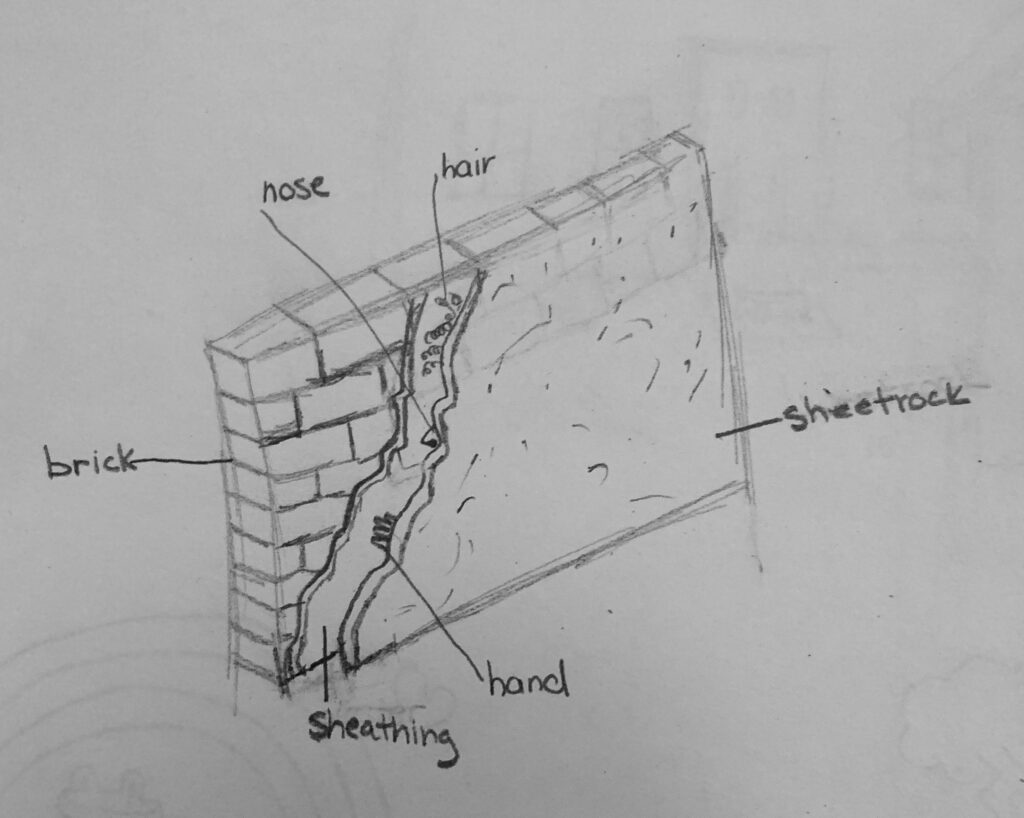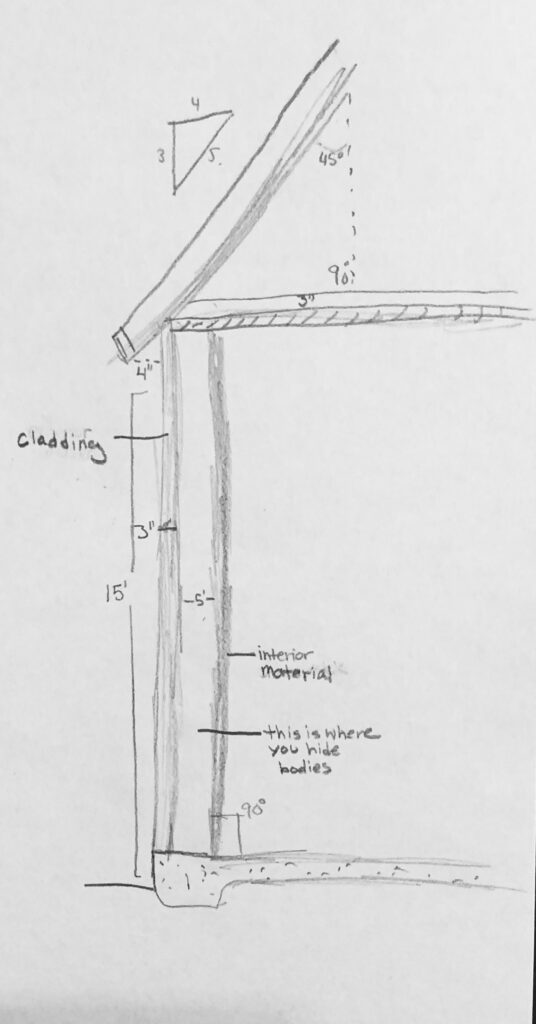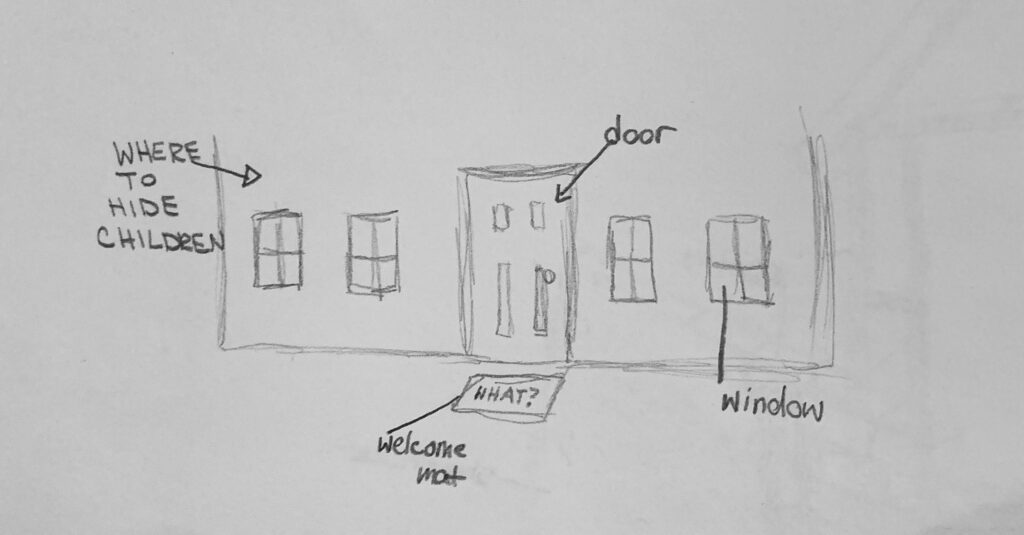One night in college, a group of girls in my dorm were hanging out, getting philosophical about empty threats. Like the professor who was way too lazy to make everyone rewrite the papers he would have to then reread. Or the student life staff member who would not actually remove our dorm doors if we snuck boys in (it was a Christian college).
I thought of one: “Like when your mom threatens to cut you up in little pieces and hide you in the walls.”
Six pairs of perfectly circular eyes silently fixed on me. It was like I’d just said…exactly what I’d just said.
“Hyperbole, right? We’re talking about hyperbolic threats?” I stammered, as though it was the literary concept I had misunderstood, and not the dynamics of parent-child relationships. “So like, when your mom threatens to ‘beat you like a piñata’, or ‘pinch your head off and tell God you died’…that’s how you know you’re not actually in that much trouble.”

Finally, someone else spoke. “Moms don’t do that.”
My mom sure did.
My mother was all about the grisly threat. And they were hyperbolic, and hyperbole was a tell that everything was going to be fine. If she couldn’t think of a legal way to punish you, you were in the clear.
It wasn’t just she who was going to kill us. It was everything else too. Whenever she needed to explain why we could not have what we wanted, the reason was some version of, “because you’ll die.” I don’t think she was overly worried about our dying, actually, she let us take a lot of healthy risks like playing sports, driving, and staying out reasonably late. But rather than argue about “fair” and “taking turns” and “whether or not she was ruining our life” she just told us it would kill us.
Me: Mom, can I set the space heater up in my room?
Her: No, you’ll catch the drapes on fire and we’ll all burn to death.
Me: Mom, can we get the internet at home?
Her: No! The internet is full of predators who will steal your information and then sneak into your house and kill you.
As a mom myself now, I get what she was doing, because I want two primary things for my own children: 1) to stay alive, and 2) to stop arguing with me. My mom’s methods were colorful, and the colors were dark. It was kind of her brand.
When we built our house out on the fringes of a small town in the Texas Hill Country, we were disturbing, apparently for the first time, uninterrupted wildlife evolution. Either that or we built the house on the site of some midcentury nuclear testing zone, because the insects on that property were gargantuan. Not like “everything-is-bigger-in-Texas” big. These were mutants.

The grasshoppers had facial features. Like little eyebrows they would raise as they watched you shriek and wail in fear. The moths were like birds of prey. There were also birds of prey, but they were normal-sized.
Most harrowing of all the insects were the centipedes. They were like something from the Jurassic Period. Huge, with detailed red pincers and yellow legs. They grew up to five or six inches out there in the nuclear zone.
To keep them intact so that we could all admire, my mom would catch the centipedes alive in Tupperware and put them in the freezer. Something about their biology makes them die in strange defensive and striking postures, and my mom saw the chance to add to her extensive collection of taxidermy.
We already had deer and fancy deer cousins, a turkey and fancy turkey cousins. Also a very stern-looking sheep cousin (but no ordinary sheep). My mom started posing the centipedes in battle scenes around the house.
It scared the shit out of the maid one day. This gave my mom the idea to move the battle scenes around the house so that they would scare the shit out of everyone.
My mom loves scaring people. When I was in middle school I learned the story of Emma Voelker, who was axed to death at age 12 by a family friend who broke into her house looking for his estranged wife. This all happened in New Braunfels, the town where I grew up. The ghost of her murderer, William Faust, supposedly haunts a hotel in the next town over.
Shortly after reading this incredibly sad story, my mom and I were staying at my grandparents’ ranch, way out in the middle of nowhere. No one else was there. My mom went to the restroom and didn’t come back. Soon the windows and doors started rattling and creaking. Once I was good and scared she burst into the kitchen and yelled, “I am the ax murderer!”
It was the most terrified I have ever been. Except when she snuck up outside the kitchen window of our house while I was baking and lunged forward out of the darkness like some kind of poltergeist, plastering herself onto the window.
Actually, no, scarier than that was the time she pretended to be dead in the pool.
Dark humor is not for everyone, but it’s absolutely for my mom and me. So is hyperbole. It bothers me a little when I meet people who seem genuinely disconcerted by dark humor and hyperbole.
Like in an interminable meeting when I whisper, “Oh my god if he talks for one more minute I’m going to jump out this window.”
And the person next to me whispers back, “That’s a bit overdramatic.”
No, no, Stan, I would actually incur serious bodily harm over a slide show. That’s exactly the kind of stable person who can hold the kind of job where you watch two-hour long Powerpoint presentations on insurance plans. The kinds of people who go jumping out of windows to express their annoyance.
I know I’ve found my people when, instead, they whisper back, “I’m going to push him out the window.”
People really seem to want me to be optimistic, bright, and cheery. Maybe it’s a woman thing, maybe it’s a mom thing, maybe it’s a Christian thing. This was a difficult essay to write, because I had to keep erasing things that my internal editor flagged as “too dark.” But I’m saving all the deleted bits, because my mom will think they’re hilarious.
Too often, “gratitude” is mistaken for “sunshine blazing out of every orifice.”
When I have to pretend everything is okay, I actually feel less okay. The more pressure I feel to overlook the grim bits, the grimmer they seem. Like the thing I’m quashing really is too big and too scary to look in the face. I think Tig Notaro’s famous “I have cancer,” set at Largo lives in legend because it proved how badly we all need to transgress the rules when the rules are telling us to be scared.
I can’t speak for my mom, but I have gallows humor because I see gallows everywhere. The anxiety and the resistance co-exist, always. George Bernard Shaw wrote, “Life does not cease to be funny when people die any more than it ceases to be serious when people laugh.”
The world needs cat videos and surprise engagement on live television, yes. But it might also need the cauterized nerves of people who lived with foreboding long before a global pandemic and, as of today, a colossal failure of deregulated utilities and laissez faire governance leading to the slow freezing of an entire state.
Foreboding is not just “worrying.” It’s more creative than worrying. It’s worrying with cinematography.

When Lewis and I first married, I was sure every siren was an ambulance on its way to scrape him and his mangled bike off the street. When he turned 31 I made him go to the dermatologist to get a “baseline assessment” of his skin so that I could watch it for moles.
Now that we have kids, he’s on his own. My foreboding has moved on.
In just about every scenario, I involuntarily picture my children dying. When we were sailing through the fjords of Patagonia — which is a real sentence I can’t even believe I just typed — I couldn’t help picturing my 6-month-old wiggling free of my iron-fisted grip, falling overboard, and disappearing into the icy waters below.
I picture them getting hit by a freak runaway delivery truck plowing into our driveway.
They are 4 and 6 years old, but I imagine them accidentally smothering themselves with their stuffed animals. I took those “crib safety” checklists to heart, apparently.
Remember that scene in Gravity when Sandra Bullock’s character tells about how her daughter died of a bump on the head? I think about it ALL THE TIME. In fact, in that entire merciless anxiety attack of a movie, I think about it the most. But you know what? I also pictured my children drifting away from me in space like George Clooney. We’ve never even been to space!
The key difference between me and the mothers we typically think of as “worriers”: I don’t do anything about it. My kids still play in the driveway, sleep with a gazillion stuffies, and hang over the edge of the boat to look into the icy waters below. I take reasonable precautions, and then proceed. If they want to be astronauts, I’ll not stand in their way. After six years of parenthood, I’ve learned that my level of foreboding is not one of those “red flags” you’re supposed to listen to. It’s the “Caution: Contents are Hot” on a steaming cup of to-go coffee. It’s always there, and never necessary.
Foreboding, to me, is just awareness of the obvious. Things could go really wrong, and they still will even if you pretend they won’t. In fact, pretending that they won’t, or pretending that they haven’t, or pretending that you have nothing to do with the reason they did is the recipe for making them worse. Like, for instance, the way the Electric Reliability Council of Texas handled this week. Or take COVID-19, for instance. Everybody from the federal government to the party people next door could have used a little more foreboding.
I could probably get by on less.
Maybe I’ve just seen too many movies, or read too much in the checkout line at the grocery store. I also suspect there’s a genetic component. My mom was always reminding us not to play on the stairs, because she’d had her tubes tied and “couldn’t get another one.”
Death is the ultimate hyperbole, because it’s literally the worst outcome of every situation that is also going to happen to everybody. It’s shorthand for all the ways life is painful, terrifying, and the lonelier gallows that I’m not ready to talk about yet. For those who will eventually die, death is the absurd punchline to life. The resolution of tension set up by continuing to live, continuing to strive, continuing to fill my heart with delicate joys. It’s the left hook out of nowhere, the ironic turn.
I want the gallows to know I’ve got a bead on them. I’m the one telling the joke. I’m not making light, but making the darkness livable.
My darkness is my bullshitting tell. I really am rooting for you, humanity.
1 thought on ““I’ll cut you up in little pieces and hide you in the walls.””
Fantastic writing as always, and an interesting? insight to your Mom.
My parents would tell us they were going to sell us to the Gypsy’s!
(before your time–ask Gran, I thinks it was a real? thing!!)
Thanks for sharing your wit and wisdom!!
Comments are closed.